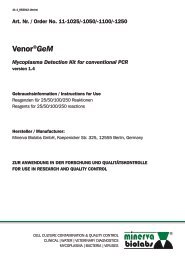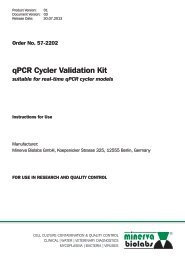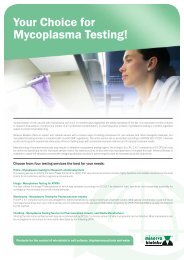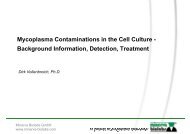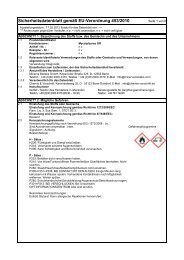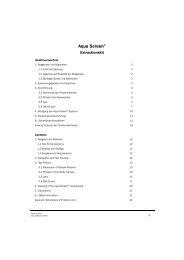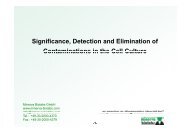Mycoplasma - Minerva Biolabs
Mycoplasma - Minerva Biolabs
Mycoplasma - Minerva Biolabs
You also want an ePaper? Increase the reach of your titles
YUMPU automatically turns print PDFs into web optimized ePapers that Google loves.
Products for the control of microbials in cell cultures & water.<br />
<strong>Mycoplasma</strong> Off<br />
<strong>Mycoplasma</strong>-Off is a highly effective solution for cleansing and disinfection of all suitable laboratory surfaces and apparatus, including clean<br />
benches, incubators, work benches, cell storage boxes and liquid nitrogen containers from mycoplasma contamination.<br />
<strong>Mycoplasma</strong>-Off is an alcohol-based solution of the powerful mycoplasma elimination reagent Mynox. It can be used as a routine contamination<br />
control program or for known or suspected mycoplasma challenges.<br />
<strong>Mycoplasma</strong>-Off is outstandingly safe in use possessing not only a strong mycoplasmacidal effect, but also being effective against bacteria, yeasts<br />
and viruses: <strong>Mycoplasma</strong>-Off has been proven to be effective against bacteria like Escherichia coli, Proteus mirabilis, Pseudomonas aeruginosa,<br />
Staphylococcus aureus, Enterococcus hirae, Trichopyhton mentagrophytes, against viruses like vaccinia viridae, BVD, polio, adeno, polyoma SV40 and<br />
MNV (norovirus) and Candida albicans, according to the requirements of CEN TC 216.<br />
The effectiveness of <strong>Mycoplasma</strong>-Off is further enhanced by its excellent detergent properties, so that clean contamination-free surfaces can be<br />
achieved in a single application. <strong>Mycoplasma</strong>-Off is a ready-to-use solution supplied in a refillable spray bottle.<br />
Background<br />
It is speculated that more than 60-70 % of the cell cultures world wide are contaminated with mycoplasma. <strong>Mycoplasma</strong> are the smallest selfreplicating<br />
organisms (0.1 to 0.8 µm) known thus far. <strong>Mycoplasma</strong> lack a cell wall which makes them resistant to cell wall specific antibiotics, such<br />
as penicillin, but susceptible to heat and chemicals such as alcohols and aldehydes. <strong>Mycoplasma</strong> occur in many places in nature, and laboratory<br />
appliances such as incubators, providing ideal living conditions.<br />
The usual way of contamination is a media spill from a contaminated cell culture during loading and unloading of the cabinet. These spills can<br />
contaminate the trays and the water reservoir. <strong>Mycoplasma</strong> are known to survive a distinct time on smooth surfaces even after the spilled culture<br />
medium has dried out. More serious is a contamination of the water tank needed to control the moisture level. <strong>Mycoplasma</strong> can survive and, as some<br />
experts assume, also grow in pure water. The contamination with mycoplasma and other bacteria in water reservoirs can effectively be minimized by<br />
adding WaterShield as preventive.<br />
For mycoplasma contamination, a treatment with <strong>Mycoplasma</strong>-Off was found to be very effective. The water bath should be removed and the interior<br />
completely sprayed with <strong>Mycoplasma</strong>-Off. After incubation for 2-3 minutes the incubator should be wiped clean with paper towels and loaded with<br />
fresh water. Keep the incubator open for 10 minutes to allow evaporation of remaining <strong>Mycoplasma</strong>-Off.<br />
Suggestions for avoiding contamination with mycoplasma in cell culture incubators:<br />
• Frequent decontamination of the incubator by spraying with <strong>Mycoplasma</strong>-Off and changing of the water, at least every 14 days.<br />
• Add WaterShield to water reservoirs for prevention of microbiolal contamination.<br />
• Prevent spills by using culture flasks with filter caps, which can be tightly closed; when using petri dishes, small trays should be used to carry the<br />
plates in and out, prevent blocking the air flow in the chamber<br />
General suggestions:<br />
• Essential: routine testing on mycoplasma contamination of the cells and discarding positive tested cultures, test every new cell culture which<br />
comes to your lab.<br />
• If possible, separate your cultures into proven "mycoplasma negative" cultures and untested or "mycoplasma positive" cultures and grow them in<br />
separate incubators.<br />
• Always use glows while handling the cultures, spray your glows with <strong>Mycoplasma</strong>-Off frequently after each working step or before handling a<br />
new culture. <strong>Mycoplasma</strong> inhabit the human pharyngeal cavity as parasites. By coughing or sneezing mycoplasma are transferred to our hands.<br />
Recommended Use<br />
Applicable in research and industry only. Not recommended for clinical applications. Use as directed. Always test a small area first for stability and<br />
coloration. <strong>Mycoplasma</strong>-Off should not be used on alcohol sensitive surfaces like acrylic and fiber glass.<br />
Kit Components<br />
Ready-to-go formulation in a spray bottle or refill bottles.<br />
Shelf Life and Storage<br />
Stable at room temperature for at least 12 months.<br />
Composition<br />
32,5 % 1-propanol - 18 % ethanol - 0,1 % glutaraldehyde - 0,05 % Mynox®<br />
Package Sizes<br />
Cat.-No. 15-1000 1 litre<br />
Cat.-No. 15-5000 5 x 1 litre refill bottles<br />
Scan for additional<br />
web information about<br />
<strong>Mycoplasma</strong> Off<br />
Contact<br />
<strong>Minerva</strong> <strong>Biolabs</strong> GmbH / Koepenicker Str. 325 / 12555 Berlin / Germany<br />
Tel. +49 (0)30 2000437-0 / Fax +49 (0)30 2000437-9<br />
info@minerva-biolabs.com / www.minerva-biolabs.com<br />
EN ISO 9001<br />
EN ISO 13485<br />
Certified Management System<br />
© 2012 <strong>Minerva</strong> <strong>Biolabs</strong> GmbH / FL32.0EN



